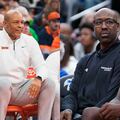Up close: Louisville’s Bedford forges personal bond, uses hands-on approach to develop players
Vance Bedford shouted a simple instruction to Andre Weathers during a 1997 Michigan spring football practice.
‘Hey,’ Bedford called out to the sophomore cornerback. ‘Run a route.’
Lining up at wide receiver, Weathers examined the third-year secondary coach positioned opposite him. Bedford, then 38 years old, wore tennis shoes.
Before the snap, Bedford pressed Weathers, jumped to his inside and began chopping his feet at maximum speed. But when the ball was snapped, Bedford stepped back. Weathers stuttered out of his break anticipating contact, and Bedford covered him seamlessly.
‘Every college kid looks at their coaches like, ‘Oh, you don’t have it anymore,” Weathers said. ‘And then for someone to get out there and be like, ‘Watch me,’ and to see it, it’s just like, ‘Wow.”
The ‘buzzing’ technique was just one minor intricacy Bedford taught Weathers, a part of his curriculum of schooling under Bedford that prepared him for the NFL. For Bedford, that teaching approach has churned out professional-level players at multiple coaching stops at the collegiate level, including Michigan, Florida and Oklahoma State.
Now serving as the defensive coordinator for Louisville (3-4, 1-1 Big East), Bedford maintains a personal, hands-on approach. He emphasizes creating personal relationships with all of his players to best understand how to teach them.
Once Bedford establishes those relationships, he passes on his comprehensive wealth of knowledge to the players. Bedford first started to acquire that knowledge from his father, Leon, a high school football coach. He then played four years as a cornerback at Texas and played one season in the NFL.
Bedford said he then got into coaching, starting at the high school and junior college level before breaking into the collegiate ranks in 1987 as the defensive backs coach at Colorado State.
After six seasons at CSU, he took the same position at Oklahoma State and has since spent time at Michigan, Florida and now Louisville, as well as with the Chicago Bears of the NFL from 1999-2004.
And everywhere he coached, Bedford constructed those crucial personal relationships with his players.
‘I believe the point of coaching is getting to know people because being a coach is like being a teacher,’ Bedford said. ‘Both my parents were school teachers. My dad was a coach. So I learned from the best, and if you don’t get to know people, how can you coach them? How can you teach them? That’s just always what I’ve always done and what I’ve believed in.’
Once Bedford understands his players, he uses his tactical knowledge to transform them into top-notch defensive backs. Bedford prepared his players to prevent them from trying to cover receivers ‘blindly,’ Weathers said.
Sometimes Bedford imparted that knowledge to his players in the film room, highlighting a certain receiver’s tendencies. In other instances, he elected to instruct a player in a one-on-one conversation. But in some cases, as he did in Ann Arbor, Mich., just more than a dozen years ago, he thought it best to just show the players himself.
During his four years in that stint at Michigan, Bedford matched up against the Wolverines’ defensive backs time after time. He taught them a series of ‘press-bail’ maneuvers used to keep receivers out of their comfort zones. This deceptive positioning prevented receivers from knowing whether they would be given a clean break at the line of scrimmage.
‘The beautiful thing about Bedford, not only did he explain those techniques to you, he would demonstrate them himself,’ Weathers said. ‘That was one of those things that really made you gravitate (toward him) and enjoy actually learning from him because he wasn’t a coach that just talked about it. He actually did it.’
On the field, Bedford never told any of the defensive backs which tactic to use in coverage. Rather, Weathers said he encouraged each of his players to choose which techniques worked best for them individually.
Bedford maintained that flexible coaching style throughout his career, including a two-year stop as the defensive backs coach for Florida.
During his time with the Gators, Bedford developed an especially close bond with defensive back Will Hill. Hill visited the Bedford household regularly. Hill said Bedford was another father figure, and he often went to him for help off the field. He was always welcome for dinner, and if he wanted to, had a place to stay the night.
That strong relationship with Bedford may have saved his college career.
After a falling out with safeties coach Chuck Heater, Hill became frustrated. There were days when he wished he was elsewhere, playing for another school instead of Florida — the program that would eventually win the 2008 national championship.
That’s when Bedford gave him a stern wake-up call.
‘Will, you’re one of the best players that we have on this team, and there’s no reason you shouldn’t be playing,’ Hill said Bedford told him.
Hill heard the message loud and clear and worked his way back onto the playing field. He credited the turnaround to Bedford and his unique ability to recognize how each player needs to be addressed.
‘He can see a kid, he can read a kid and know how to bring the potential out of every young man because everybody’s not the same,’ Hill said. ‘He has the talent — that’s what I call it — the talent to look in within a person and bring out their best. And that’s what he did with me.’
Currently a member of the Arizona Rattlers of the Arena Football League, Hill still keeps in touch with his former coach. And who knows where he would be now had Bedford not set him straight back at Florida.
‘Coach Bedford, he is his own person. Most coaches, they can coach, but they really can’t explain the game,’ Hill said. ‘He was just deep down with it. He knew how to relate with his players, especially me while he was coaching me.’
After the 2009 season, Bedford left Florida and brought that coaching ability to Louisville as the Cardinals’ defensive coordinator under then-first-year head coach Charlie Strong.
As he did with Weathers and Hill, Bedford establishes personal relationships with all of his players. That’s the key to his high ratio of players that move on to the NFL.
Now at Louisville, the 53-year-old mastermind may not be able to lock down future professional athletes anymore, but mentally he hasn’t lost a step.
‘He knows how to develop players and that’s really what it’s all about,’ Strong said in the Big East coaches’ teleconference Monday. ‘You can go recruit those good players, but once you go recruit them you have to be able to develop them, and he does.’
sebail01@syr.edu" data-scaytid="8">sebail01@syr.edu




